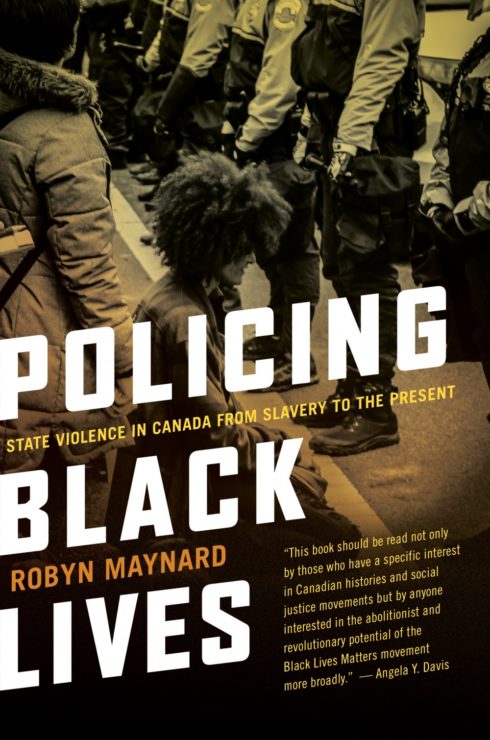Author spoke about state violence and increased recognition of systemic racism in Canadian society

Please be advised that this article contains discussions of police violence that may be disturbing to some readers.
This year’s iteration of UVic Humanities Literacy Week placed an emphasis on BIPOC voices and non-traditional forms of research in the humanities. Between Feb. 8 and Feb. 12, the Faculty of Humanities hosted three events and promoted over a dozen books recommended by faculty members.
The third and signature event of the week was a talk with renowned Canadian author, academic, and activist Robyn Maynard. Other Humanities Literacy Week events included a discussion of Indigenous artifacts by UVic faculty and an unconventional essay competition where students performed songs and dances to express their points.
Maynard is the author of Policing Black Lives: State Violence in Canada from Slavery to the Present, a book published in 2017 that challenges the widely held perception that Canada is a multicultural state that has largely avoided the racist pitfalls of the United States and for the most part maintained racial equality. Drawing from years of research and advocacy, Maynard has worked to expose the anti-Blackness and racism that pervades Canada’s state institutions from the RCMP to the welfare state to border patrol. She traces back this systemic racism to the 17th century when Black Canadians first arrived in Canada as slaves — a system which lasted for 200 years.
During the event, Maynard fielded questions from hosts Annalee Lepp, acting dean of the Faculty of Humanities, and Moustapha Fall, assistant teaching professor in the French department, as well as from members of the audience. She also did a selected reading from her book which encompassed the reasons for her undertaking such a work as well as several examples of the anti-Blackness that is at the root of her critique of the Canadian state.
“Before this book was a cohesive idea, it was germinating in my mind for years,” Maynard quoted from the introduction of her book. “I realized there was still far too little literature addressing, in one place, the specificities of how criminal and immigration laws, inequitable access to work and housing, and other state policies and institutions interact to shape the conditions of Black life in this country.”
Maynard’s talk at UVic follows a year where the deaths of George Floyd and Breonna Taylor prompted millions to rise up across the world against systemic racism. As Maynard explains in her book, racialized murder perpetrated by police also occurs with frightening regularity in Canada. This violence, however, does not receive the attention it is due. Canadian media has failed to cover these deaths and many white people in the Canadian public hold the false belief that Canada isn’t racist.
Sophia Cook. Lester Donaldson. Michael Wade Lawson. Marcellus Francois. Andrew Loku. These are just a few of the victims of Canadian police violence that Maynard mentions in her book. Many of the deaths occur during wellness checks or following minor infractions.
In 2020, several BIPOC Canadians were killed as a result of police violence. Chantel Moore, from Tla-o-qui-aht First Nation on Vancouver Island, was shot during a police wellness check in Edmundson, New Brunswick. D’Andre Campbell, a Black man, was also shot during a wellness check in Brampton, Ontario. Regis Korchinski-Paquet was a Black and Indigenous woman, was killed in an encounter with police in Toronto. This is a non-exhaustive list.
At the UVic talk, Maynard noted that her goal in writing the book was to make the history of anti-Blackness in Canada and how it has evolved “[more] legible for activists, policymakers, students, and concerned community members.”
In response to a question from UVic President Kevin Hall about the ways in which universities can combat systemic racism, Maynard recommended universities end policing on campus and to begin to think about safety in ways that aren’t punitive. Maynard said that BIPOC members of post-secondary communities are often under the same racialized surveillance by campus security that members of the wider community face from the police.
Maynard also stated that post-secondary institutions need to be aware of the role they play in gentrifying their surrounding neighbourhoods due to a continuous influx of well-educated and privileged members of society. This gentrification often displaces Black, poor, or otherwise marginalized people in neighbourhoods and leads to their criminalization as unwanted members.
Maynard says that this rethinking of safety is part of a broader movement towards full abolition. Rather than reforming policing, Maynard says divesting from policing and punishment will lead to safer communities.
“What we’re actually seeing is a shift in how we think about safety and understanding that perhaps, for many of us, safety has not come from the hands of police,” said Maynard. “Which also gives us the capacity to say, ‘well, if this doesn’t work, then what else would it mean for communities to be safe?’”
Despite the continued violence being inflicted on BIPOC people in Canada by the state, Maynard discussed the increased awareness around systemic racism that she has witnessed emerging in Canada since the publication of her book. She spoke of her hope and optimism for the future.
“I think that what we’re seeing now is an even broader reckoning, and an even broader, really society-wide investigation into the way that anti-Blackness is embedded in the system of policing, of the criminal justice system, and the way that these are institutions of racial violence,” Maynard told the Martlet.







